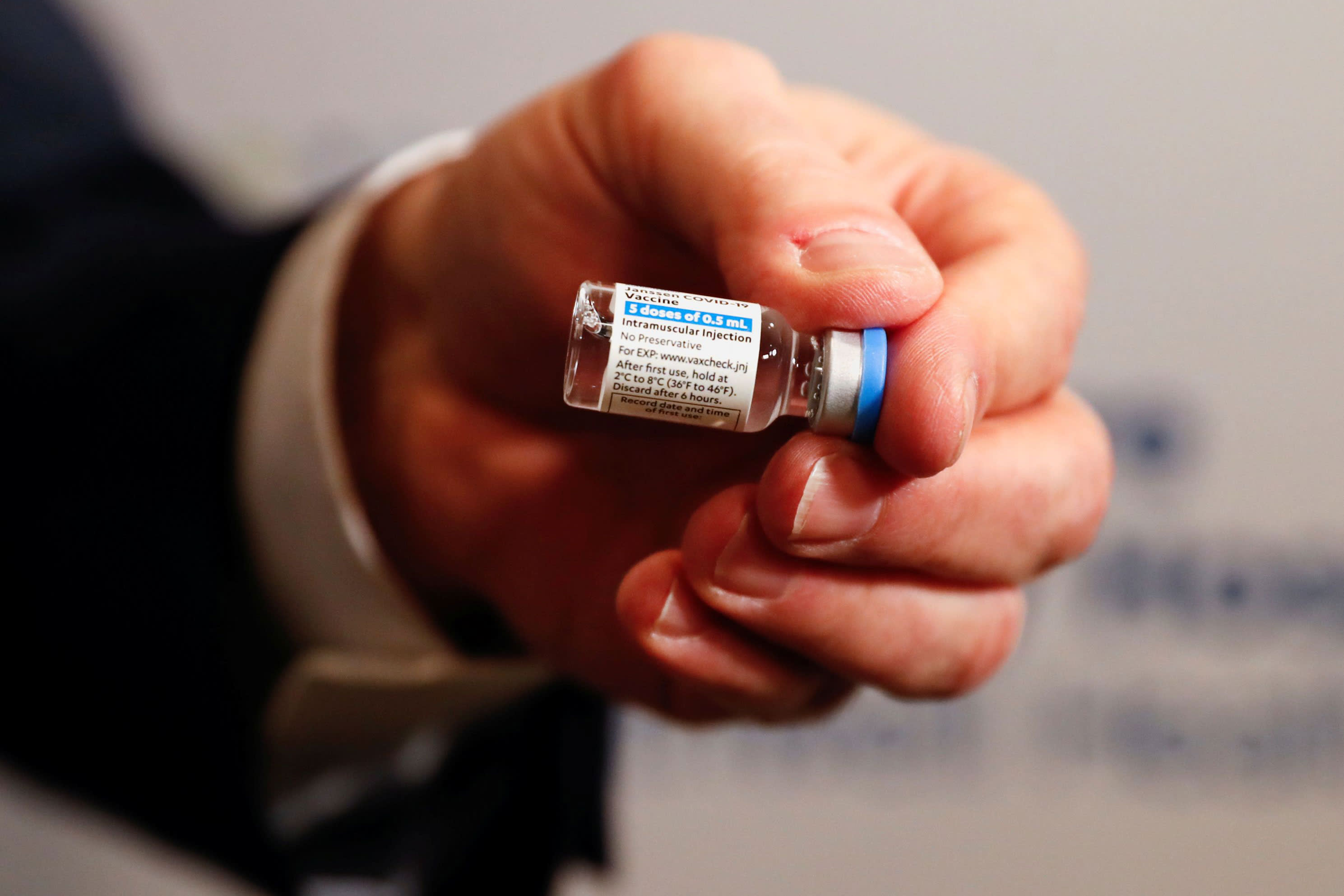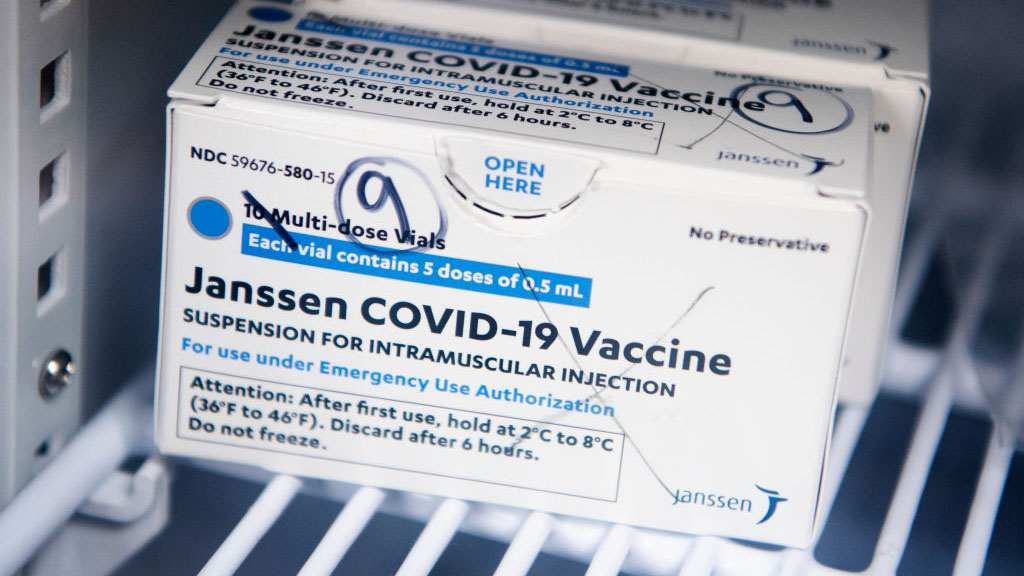As the U.S. recommends a “pause” in use of the single-dose Johnson & Johnson COVID vaccine while regulators investigate reports of potentially dangerous blood clots, what does that mean for Illinois appointments and for those who already received the vaccine?
Here's a breakdown of everything you should know about the temporary halt of the Johnson & Johnson vaccine.
What does this mean for Illinois vaccinations and appointments?
Illinois will pause use of the Johnson & Johnson vaccine "out of an abundance of caution" following a recommendation from the U.S. Centers for Disease Control and Prevention and the U.S. Food and Drug Administration, the state's health department said Tuesday.
"IDPH has notified all Illinois COVID-19 providers throughout the state to discontinue use of the J&J vaccine at this time," the Illinois Department of Public Health said in a statement. "In order to keep appointments, IDPH is strongly advising providers to use Pfizer-BioNTech and Moderna vaccines."
Health officials say a majority of Illinois' vaccine doses are from Moderna and Pfizer's vaccines. Of the expected 483,720 doses the state is set to receive next week, 5,800 were set to be Johnson & Johnson.
This week, the state had received 17,000 doses of the Johnson & Johnson vaccine, officials said.
"IDPH will continue to update the public as additional information becomes available," the department's statement read.
Walgreens announced that it would also pause its use of the J&J vaccine, saying the pharmacy chain is "immediately suspending the administration of the J&J vaccine at our stores and off-site clinics and are awaiting further guidance."
"We are reaching out to patients with scheduled appointments and rescheduling vaccinations from other manufacturers, as supply allows," Walgreens said in a statement. "We will continue to work closely with the FDA and CDC and, as always, the health and safety of our patients and customers is our highest priority."
Feeling out of the loop? We'll catch you up on the Chicago news you need to know. Sign up for the weekly> Chicago Catch-Up newsletter.
Similarly, Jewel-Osco said it would also hold on administering Janssen doses.
"Patients who have an appointment scheduled for the Janssen vaccine will be notified that their appointment has been canceled, and they will be directed to a link to reschedule for the Pfizer or Moderna vaccine," the grocery chain said in a statement. "We add appointments to our online scheduler as doses become available. We appreciate the community's patience and understanding."
Cook County said it too was pausing use of the Johnson & Johnson COVID-19 vaccine.
"Following guidance released this morning from the US Food and Drug Administration and the US Centers for Disease Control and Prevention, Cook County Health will pause the use of the Johnson & Johnson vaccine until the FDA and CDC complete their review," a spokeswoman for Cook County Health said in a statement Tuesday morning.
Individuals with appointments for the Johnson & Johnson vaccine this week will instead receive the first dose of either Moderna or Pfizer's vaccine, depending on the vaccination site, the county said. Anyone who has a scheduled appointment but does not want the Moderna or the Pfizer vaccine should call 833-308-1988 to cancel or reschedule their appointment, officials said.
Kane County canceled two vaccination events set for Tuesday in wake of the news.
In Aurora, a state-run mass vaccination site located 970 N. Lake St. was canceled and the 1,000 appointments that had been booked for the clinic will be rescheduled, city officials said in a release. Tuesday was the city's last Johnson & Johnson clinic scheduled so far.
"We are encouraging anyone who took the Johnson & Johnson vaccine in recent days to seek medical attention if they have concerns. While these cases may be rare, please make it a priority to visit a healthcare provider immediately," the city said in a statement. "We look forward to a thorough review of the Johnson & Johnson vaccine by federal health officials. In the meantime, we will continue to support vaccine rollout efforts where vaccines developed by Pfizer and Moderna are used."
An Elgin vaccination location at 1080 E. Chicago St. was also canceled.
Anyone who had appointments for both locations will be rescheduled for a Pfizer dose on April 20.
“I would like to encourage everyone who was scheduled to receive the Johnson and Johnson vaccine today at the Aurora and Elgin mass vaccination sites to please reschedule their appointments,” County Board Chairman Corinne Pierog said in a statement. “Our commitment to the safety of our residents is unwavering. Even though the CDC and IDPH have placed a pause on administering the Johnson and Johnson vaccine, residents should feel confident about Moderna and Pfizer and get vaccinated.”
Additional vaccine appointments in the county may still be available at www.kanevax.org, officials said.
What about Chicago?
Chicago is also pausing use of the Johnson & Johnson COVID vaccine, the city said Tuesday.
"We are working closely with our partners at the federal and local level to determine how this impacts the city’s vaccine operations," the Chicago Department of Public Health said in a statement.
Several vaccination events are being halted for now, including the city's homebound program, which brings the single-dose vaccine to those who cannot leave their homes, as well as vaccinations at O'Hare Airport, through the CTA's mobile vaccination bus and at some events through employers and unions, like a vaccination event for food service workers that had been scheduled with the Illinois Restaurant Association.
Vaccinations at the Chicago State University site that were initially supposed to be Johnson & Johnson doses may be switched to the other two vaccines, officials said, depending on supply.
As for the United Center, CDPH Commissioner Dr. Allison Arwady said Pfizer doses are currently being administered but the city is "waiting to hear from FEMA on their intended plans for vaccination" as Johnson & Johnson doses were expected to be used at the facility in the coming days and weeks. For now, the city has stopped allowing appointments for Johnson & Johnson vaccines through the facility.
Gov. J.B. Pritzker said the state will be sending 50,000 first doses of the Pfizer and Moderna vaccines to the city within the next week, with plans to send an additional 50,000 doses in the coming weeks to be used for the second shots.
CDPH said it was not aware of any local cases so far.
"While incredibly rare, anyone who has received the J&J vaccine who develops severe headache, abdominal pain, leg pain, or shortness of breath within three weeks after their vaccination should contact their health provider," the city said. "This recommendation does not affect Pfizer or Moderna vaccine in any way. Vaccination remains critical to protect Chicagoans from COVID-19 and we will share more information as we receive it."
Chicago has received a total of 91,000 doses of the single-shot Johnson & Johnson vaccine in five shipments since February, according to the city's data. It's not clear how many of those doses have already been administered.
Why are regulators pausing the J&J vaccine?
In a joint statement Tuesday, the CDC and FDA said they were investigating unusual clots in six women that occurred 6 to 13 days after vaccination. The clots occurred in veins that drain blood from the brain and occurred together with low platelets. All six cases were in women between the ages of 18 and 48.
The reports appear similar to a rare, unusual type of clotting disorder that European authorities say is possibly linked to another COVID-19 vaccine not yet cleared in the U.S., from AstraZeneca.
More than 6.8 million doses of the J&J vaccine have been administered in the U.S., the vast majority with no or mild side effects.
An advisory committee is scheduled to meet Wednesday to review the reactions and consider how to proceed.
Officials say they also want to educate vaccine providers and health professionals about the “unique treatment” required for this type of clot.
"Treatment of this specific type of blood clot is different from the treatment that might typically be administered," the FDA and CDC statement read. "Usually, an anticoagulant drug called heparin is used to treat blood clots. In this setting, administration of heparin may be dangerous, and alternative treatments need to be given."
What symptoms should you watch for if you already got the J&J vaccine?
Officials are recommending that people who were given the J&J vaccine who are experiencing severe headache, abdominal pain, leg pain, or shortness of breath within three weeks after receiving the shot contact their health care provider.
If you received the J&J shot and have not developed any of the side effects associated with signs of blood clots within three weeks after vaccination, the risk of an adverse reaction is unlikely. Health officials urge patients to continue monitoring for symptoms.
"This is different than the short-term side effects of just a couple of days," Arwady said Tuesday. "If people got a Johnson & Johnson vaccine in the last two to three days, and they're having, you know, they're feeling tired or they're having a sore arm or a little bit of a headache - that's not what we're talking about. We're talking about really a more severe headache, more severe side effects that are coming more in the, you know, typically, in this case they ranged from six to 13 days after vaccination on, but we're saying up to three weeks just just to let folks know."
Arwady said it is believed, as of now, that the symptoms in these cases take time to show up and likely won't appear in the same way as traditional side effects that often are seen within the first 24 to 48 hours.
"The thoughts on this, if this does turn out to be linked in some ways, it is probably immune mediated and your platelets have about a 10-day lifetime in your body and it takes time for this to show up and so if people had a headache in the day right after they got vaccinated, and it went away, I would not have significant concern about that at all," she said. "This is more if you were to see a severe headache, abdominal pain, you know leg pain, or just others concerning symptoms appearing more in the kind of one to two weeks post-vaccine and we're saying, up to three weeks at this point. We want people to seek medical care, but these are the things that we would want people to seek medical care for anyway."



